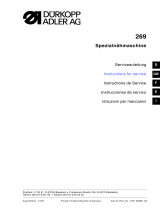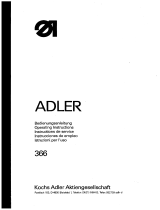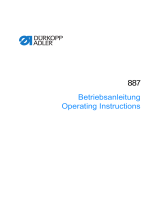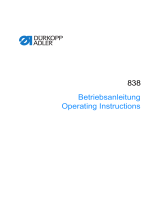Page is loading ...
Page is loading ...
Page is loading ...
Page is loading ...
Page is loading ...
Page is loading ...
Page is loading ...
Page is loading ...
Page is loading ...
Page is loading ...
Page is loading ...
Page is loading ...

Foreword
This instruction manual is intended to help the user to become familiar
with the machine and take advantage of its application possibilities in
accordance with the recommendations.
The instruction manual contains important information on how to
operate the machine securely, properly and economically. Observation
of the instructions eliminates danger, reduces costs for repair and
down-times, and increases the reliability and life of the machine.
The instruction manual is intended to complement existing national
accident prevention and environment protection regulations.
The instruction manual must always be available at the machine/sewing
unit.
The instruction manual must be read and applied by any person that is
authorized to work on the machine/sewing unit. This means:
– Operation, including equipping, troubleshooting during the work
cycle, removing of fabric waste,
– Service (maintenance, inspection, repair) and/or
– Transport.
The user also has to assure that only authorized personnel work on the
machine.
The user is obliged to check the machine at least once per shift for
apparent damages and to immediatly report any changes (including the
performance in service), which impair the safety.
The user company must ensure that the machine is only operated in
perfect working order.
Never remove or disable any safety devices.
If safety devices need to be removed for equipping, repairing or
maintaining, the safety devices must be remounted directly after
completion of the maintenance and repair work.
Unauthorized modification of the machine rules out liability of the
manufacturer for damage resulting from this.
Observe all safety and danger recommendations on the machine/unit!
The yellow-and-black striped surfaces designate permanend danger
areas, eg danger of squashing, cutting, shearing or collision.
Besides the recommendations in this instruction manual also observe
the general safety and accident prevention regulations!

General safety instructions
The non-observance of the following safety instructions can cause
bodily injuries or damages to the machine.
1. The machine must only be commissioned in full knowledge of the
instruction book and operated by persons with appropriate training.
2. Before putting into service also read the safety rules and
instructions of the motor supplier.
3. The machine must be used only for the purpose intended. Use of
the machine without the safety devices is not permitted. Observe all
the relevant safety regulations.
4. When gauge parts are exchanged (e.g. needle, presser foot, needle
plate, feed dog and bobbin) when threading, when the workplace is
left, and during service work, the machine must be disconnected
from the mains by switching off the master switch or disconnecting
the mains plug.
5. Daily servicing work must be carried out only by appropriately
trained persons.
6. Repairs, conversion and special maintenance work must only be
carried out by technicians or persons with appropriate training.
7. For service or repair work on pneumatic systems, disconnect the
machine from the compressed air supply system (max. 7-10 bar).
Before disconnecting, reduce the pressure of the maintenance unit.
Exceptions to this are only adjustments and functions checks made
by appropriately trained technicians.
8. Work on the electrical equipment must be carried out only by
electricians or appropriately trained persons.
9. Work on parts and systems under electric current is not permitted,
except as specified in regulations DIN VDE 0105.
10. Conversion or changes to the machine must be authorized by us
and made only in adherence to all safety regulations.
11. For repairs, only replacement parts approved by us must be used.
12. Commissioning of the sewing head is prohibited until such time as
the entire sewing unit is found to comply with EC directives.
13. The line cord should be equipped with a country-specific mains
plug. This work must be carried out by appropriately trained
technicians (see paragraph 8).
It is absolutely necessary to respect the safety
instructions marked by these signs.
Danger of bodily injuries !
Please note also the general safety instructions.

Index Page:
Preface and general safety hints
Fitting the pneumatic foot lift class 367
(Edition 04/2010)
1. General information
1.1 Scopeofdelivery............................................... 3
2. Fitting
2.1 Replacetheslidebarbyacylinder.................................... 4
2.2 Replacebarsbynewbars.......................................... 6
2.3 Fitandconnectmaintenanceunit..................................... 7
GB
Page is loading ...

1. General information
The subclass 367-170010 can be retrofitted with the pneumatic foot
lift.
ATTENTION!
The operating pressure of class 367 amounts to 6 bar. Should the
pressure of your supply line be higher than 6 bar, it has to be reduced
to 6 bar at the supply unit of the sewing machine!
1.1 Scope of delivery
Before you start the installation:
Please check whether all components of the retrofit kit are included in
the scope of delivery.
The complete mounting kit for the pneumatic foot lift with the order
number 0367 595144 consists of the following components:
Component
Parts number
1 Sound absorber
9780 982005
1.3 m Hose
9731 005004
1 Connection WI-N
9790 010010
2 Screw connection GD-E
9790 200001
1 Screw connection WI-E
9790 201001
1Cylinder
0367 135174
1Bars
Z 100 000343
1 Fastening clip
9840 120026
1 Maintenance unit
9780 000108
1 Pressure line
0797 003031
1 Coupling box
0744 001793 A
1 Coupling plug (at the pressure line)
0744 001793 B
2 Ideal clip (1x at the pressure line)
0742 002096
1 Hose nozzle
0744 001796
1Allenscrew
9202 002077
1 Pneumatic device plan
9770 367503
GB
3

2. Fitting
Caution: Danger of injury!
Switch off the main switch and pull out the mains plug before you
start to install the pneumatic foot lift. The installation must be done
by qualified technicians only.
–
Tilt the sewing machine to the back.
–
Loosen the 6 screws of the oil pan and take the oil pan off.
2.1 Replace the slide bar by a cylinder
–
Remove the locking washer 3from the right end of the slide bar 2
and the screw 1 from the left end of the slide bar 2.
–
Removetheslidebar2 from the finger on the right.
–
Run the hose 6 through the fixture 5 at the rear panel of the
machine.
–
Push the hose 6 on the connection 8 of the cylinder 4.
–
Fit the cylinder 4 instead of the slide bar 2. The piston must show
to the right and the throttling screw 7 must show down.
Ifyouturnthethrottlingscrew7 counter-clockwise, the piston is
moving more quickly. The sewing foot is lifted more quickly.
Ifyouturnthethrottlingscrew7 in clockwise direction, the piston
is moving more slowly. The sewing foot is lifted more slowly.
–
Put the locking washer 3 on the right of the cylinder 4 again and
screw in screw 1 on the left again.
–
Run the hose 6 to the right at the rear panel of the machine. Run
the hose outside through the cut-out 9 down on the right of the
sewing machine.
4
12 3
14536
78

–
Now you have to guide the hose downward with the connection
WI-N 12.
–
For this purpose put the fastening clip 10 on the hose 6.Inorder
to measure the length of the hose 6, hold the fastening clip 10
close to the drill-hole down on the right of the sewing machine.
Cut the hose 6 off behind the fastening clip 10.
–
Connect the hose ends with the connection WI-N 12.
–
Screw the hose 6 with the fastening clip 10 (directly at the
connection WI-N 12 with the Allen screw 11) on the drill-hole down
on the right of the sewing machine.
Guide the loose end of the hose underneath the stand.
–
Put the oil pan on and tighten the 6 screws.
–
Tilt the sewing machine to the front again.
Hints
In case you have installed the sewing light 9822 510001, not only
the hose but also the cable of the lighting are screwed on the
drill-hole down on the right of the sewing machine.
The Allen screw 11 included in the accessories is long enough to
tighten 2 fastening clips.
5
GB
69 10 11 12

2.2 Replace bars by new bars
–
Screw the sound absorber 7 in the upper drill-hole. Screw the
screw connections GD-E 5 and 6 in the other two drill-holes.
Tighten the screw connections 5 and 6 so that the threads are
correctly sealed by the applied sealing compound.
–
Remove the nuts of the old bars at pedal 1 and drive 4.Remove
the old bars.
–
Fit the new bars 3 instead of the old bars. Put on the washers and
screw on the nuts 1 and 4 again.
–
Loosen screw 2 in order to adjust the position of the pedal. Adjust
the pedal to fit and tighten the screw 2 again.
6
1234 567

2.3 Fit and connect the maintenance unit
–
Screw the hose nozzle 10 in the cubical-shaped connection 12 of
the maintenance unit 13.
–
Remove the connecting piece 8 with the washers from the
maintenance unit 13 and replace it by the screw connection
WI-E 9.
–
Screw the maintenance unit 13 on the stand in such a way that the
water separator shows downward in a vertical direction. If you
have got the stand MG 55-3, fit the maintenance unit 13 at the
cross bar on the right beneath the drive.
–
Guide the hose coming out of the sewing machine to the new
bars 3. Cut the hose off in such a way that it is not under tension
and push it into the screw connection GD-E 6.
–
Connect the screw connection GD-E 5 and the screw connection
WI-E 9 at the maintenance unit with the remaining hose.
–
Screw the coupling box 11 on your pressure supply.
–
Put the Ideal clip 15 on the pressure line 16. Then push the
pressure line 16 on the hose nozzle 10 at the maintenance unit 13.
Secure the pressure line on the connection piece 10 by the Ideal
clip 15.
–
Plug the coupling plug 14 of the pressure line 16 in the coupling
box 11 of your pressure supply.
ATTENTION!
The operating pressure amounts to 6 bar. Check at the maintenance
unit whether 6 bar is indicated!
If necessary, adjust the pressure at the maintenance unit to 6 bar
before actuating the pneumatic foot lift.
7
GB
9
5 6 12 13 9
8
10 11
14
15
16

Your own notes:
8
/











